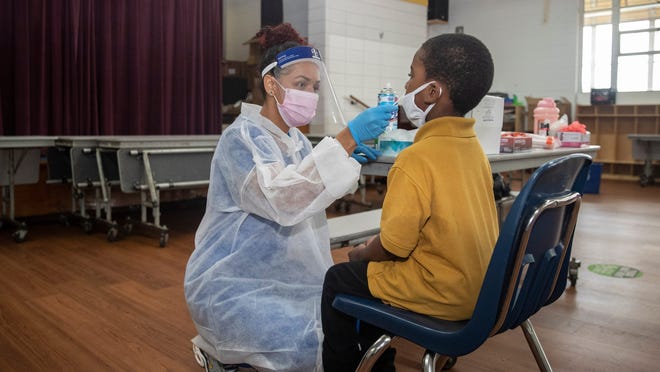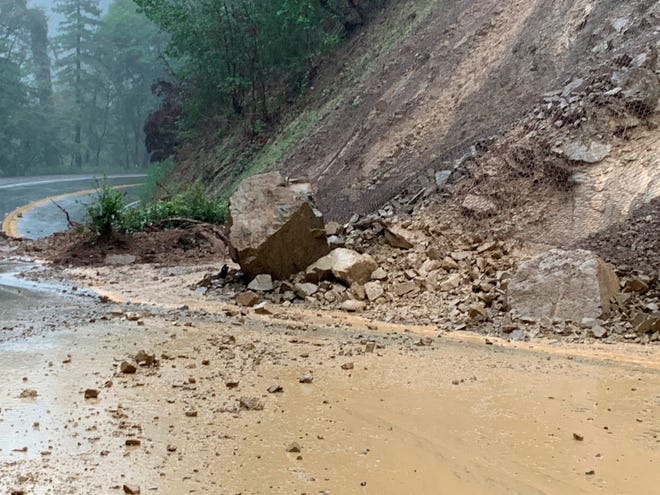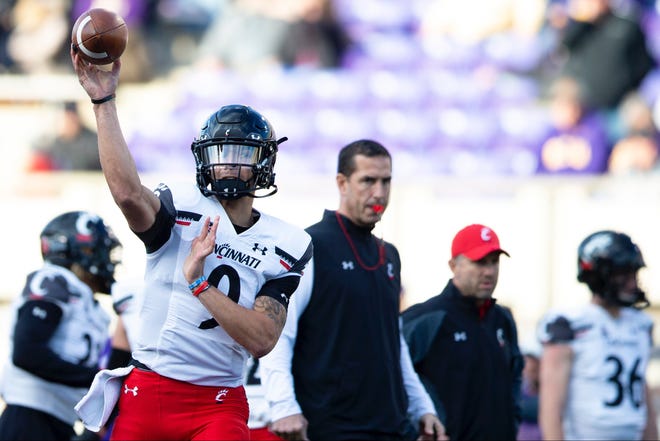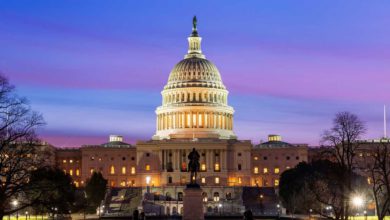
One day after the Centers for Disease Control and Prevention endorsed COVID-19 vaccine booster shots for millions of older and high-risk Americans, President Joe Biden praised the move as a "key step" in the fight against the coronavirus pandemic.
"We have the tools to beat COVID-19 if we come together as a country and use the tools we have," Biden said Friday. He added he plans to get his booster shot "as soon as I can get it done."
The president's comments came hours after CDC Director Dr. Rochelle Walensky accepted a series of recommendations from a key panel of advisers to make booster shots for the Pfizer vaccine available for people 65 and older, nursing home residents and some adults who have underlying health problems at least six months after the second dose.
She also overruled the panel on endorsing a third shot for at-risk workers, ignoring her own advisers but bringing the CDC policy in line with the Food and Drug Administration's recommendation earlier this week.
Walensky said the decision was a "scientific close call," pointing to the length of the hourslong advisory committee meeting and the heated debate. She ultimately issued the recommendation out of concern for the "everyday heroes of our society," she said.
"Many of our frontline workers, essential works and those in congregate settings come from communities that already have been hardest hit. Withholding access for boosters from these people and communities would only worse the inequities I have committed to fight against," Walensky said in a White House coronavirus task force briefing Friday.
The CDC's endorsement is considered a boon for Biden's campaign to provide booster shots for most Americans – a plan some health officials criticized as premature.
The other two available vaccines – Moderna and Johnson & Johnson – have not received federal authorization for a booster shot, and the CDC advisory panel did not vote Thursday on the issue of mixing boosters.
Walensky said the CDC endorsement of the Pfizer booster is "a first step" and that the agency expected to review similar applications from Moderna and Johnson & Johnson "with urgency"in the future.
Also in the news:
►A live televised interview with Vice President Kamala Harris was delayed on Friday after two hosts of the "The View" learned they tested positive for COVID-19 moments before they were to interview her.
►Costco said it will limit consumers' purchase of items including toilet paper, paper towels, and bottled water due to supply chain issues and demand generated by the rise of the delta variant.
►National Guard teams will be deployed Friday to Deaconess Midtown and Deaconess Gateway hospitals in Indiana for a week to support medical staff responding to COVID-19.
►Alachua County schools in north-central Florida are the first in the nation to receive federal money after state officials punished the district for defying them by requiring masks at schools.
►India has reported already reported twice as many deaths in 2021 as it did in all of last year, Johns Hopkins University data shows.
►The World Health Organization is recommending two antibodies – casirivimab and imdevimab – made by Regeneron should be given to people infected with COVID-19 who are at highest risk of hospitalization and to people whose own immune systems have not mounted a response.
📈Today's numbers: The U.S. has recorded more than 42.6 million confirmed COVID-19 cases and more than 684,000 deaths, according to Johns Hopkins University data. Global totals: More than 230 million cases and 4.7 million deaths. More than 182 million Americans — 55% of the population — have been fully vaccinated, according to the CDC.
📘 What we're reading: A daily pill to treat COVID-19? It could be just months away, scientists say. Read here.
Keep refreshing this page for the latest news. Want more? Sign up for USA TODAY's Coronavirus Watch newsletter to receive updates directly to your inbox and join our Facebook group.
20M Americans eligible to receive booster shots at thousands of locations
More than 20 million Americans are now eligible to receive COVID-19 booster shots, and another 40 million will soon become eligible once six months pass since their second Pfizer shot, U.S. health officials said Friday.
Americans can get booster shots at more than 80,000 places across the country, including 40,000 local pharmacies, Jeff Zients, White House coronavirus task force coordinator, said at a briefing Friday.
"There are people who will be getting booster shots as early as this afternoon," Zients said.
Colorado has nine mobile vaccination clinics ready to administer boosters to people where they are, Zients said, and several states are ready to activate larger vaccination centers to get shots in arms "as quickly as possible," with full reimbursement from the federal government.
Pharmacies and grocers are hiring more employees to ramp up capacity for administering boosters, Zients said. CVS is hiring 25,000 workers, and Hy-Vee is hiring more than 2,000 technicians, he said. Kroger is ramping up capacity to 1 million booster shots per week, Zients said.
Zients reminded Americans that booster shots are free regardless of immigration or health insurance status, and no ID is required.
Dr. Anthony Fauci, the nation's top infectious diseases expert, urged Americans to wait the full six months before getting a booster shot. It's "natural" for people to be feeling anxious to get their booster, he said, but there are medical reasons to wait.
'We will not boost our way out of this pandemic,' CDC head says
While the U.S. is rolling out booster shots, officials remain focused on getting shots in the arms of people who are unvaccinated, Walensky said. Three out of four Americans 12 and older now have at least one vaccine shot, and the U.S. is administering about 800,000 shots a day, Zients said.
"We will not boost our way out of this pandemic. Infections among the unvaccinated continue to fuel this pandemic," Walensky said.
Walensky said there is "very little data" showing a booster shot will decrease the transmissibility of the coronavirus, "especially in the context of the delta variant."
Poll: Just 37% of unvaccinated adults say COVID-19 is major public health threat
No more than four-in-ten unvaccinated adults see COVID-19 as a major threat to public or personal health, according to a new Pew Research Center poll released Friday.
Pew conducted the survey Aug. 23 to 29 and found adults who are not vaccinated are about half as likely as those who have received at least one vaccine dose to see COVID-19 as a major threat to the health of the U.S. population.
About 70% of vaccinated people say COVID-19 is a major threat to public health, and 35% say it's a major threat to personal health. Among unvaccinated people, 37% say COVID-19 is a major threat to public health, and 21% say it's a major threat to personal health.
South African president: Global vaccine distribution 'an indictment on humanity'
The inequity of COVID-19 vaccine distribution came into sharper focus this week as many of the African countries whose populations have little to no access to the life-saving shots stepped to the podium to speak at the U.N.’s annual meeting of world leaders.
South African President Cyril Ramaphosa, speaking by video link, urged U.N. member states to support a proposal to temporarily waive certain intellectual property rights established by the World Trade Organization to allow more countries, particularly low- and middle-income countries, to produce COVID-19 vaccines.
"It is an indictment on humanity that more than 82% of the world’s vaccine doses have been acquired by wealthy countries, while less than 1% has gone to low-income countries," he said.
The U.S., Britain, France, Germany and Israel are among the countries administering boosters or have announced plans to do so. Namibia president Hage Geingob called it "vaccine apartheid."
Dozens of school bus drivers have died of COVID, fueling shortages
Natalia D’Angelo, 43, got sick right after school started in August. She died of COVID-19 before the end of the month.
D’Angelo is among at least 12 school bus workers in Georgia who have died of COVID-19 since the beginning of the school year. In all, school bus drivers in at least 10 states have died of the disease since August, according to news reports and a Twitter feed called "School Personnel Lost to Covid."
The deaths raise questions about whether school bus drivers are at higher risk of getting COVID-19 — a worry that's contributing to a nationwide shortage of the drivers. Medical experts are split. It’s difficult, if not impossible when local infection rates are high, to determine how any particular bus worker became infected — whether it occurred at home, in a community setting or on the job. Read more here.
– Andy Miller and Phil Galewitz, Kaiser Health News
Wisconsin reports more COVID cases in children than any other age group
So far this week, more than 1,100 people under the age of 18 in Wisconsin have tested positive for COVID-19. That is more than any other age group, according to state Department of Health Services data.
Last week, 4,686 people under the age of 18 tested positive — more than double any other age group. In fact, since the week of Aug. 8, children have been diagnosed with more cases than every other group each week.
Children's Hospital of Wisconsin continues to see an increase in the number of kids in the hospital who test positive for COVID-19, but most are asymptomatic unless they have underlying health conditions.
Since the beginning of the pandemic, Wisconsin has recorded three deaths in people age 19 and younger. Read more here.
– Drake Bentley, Milwaukee Journal Sentinel
Contributing: The Associated Press
Source link










